
- Details
- Category: Blog Posts
A few days after finishing my finals at the University of Georgia I boarded a plane to Stellenbosch, South Africa for five weeks of adventure, learning, and community engagement. My study abroad experience allowed me to immerse myself in the culture of one of the most unique countries in the world, and to see how politics and society are intertwined throughout history. While abroad I took two classes, South African Society and Politics of Development, where we studied how the history and implementation of apartheid continues to negatively impact specific communities throughout South Africa. I also had the opportunity to travel to Botswana and Zimbabwe where I went on game cruises, visited Victoria Falls, and bungee jumped. Although I got to do all those cool things and receive course credit, the most impactful thing I did while abroad was volunteering at a non-governmental organization called Vision Afrika in the local township of Kayamandi. This is the part of my experience that really allowed me to tie what I learned in class to what is actually going on throughout the country.
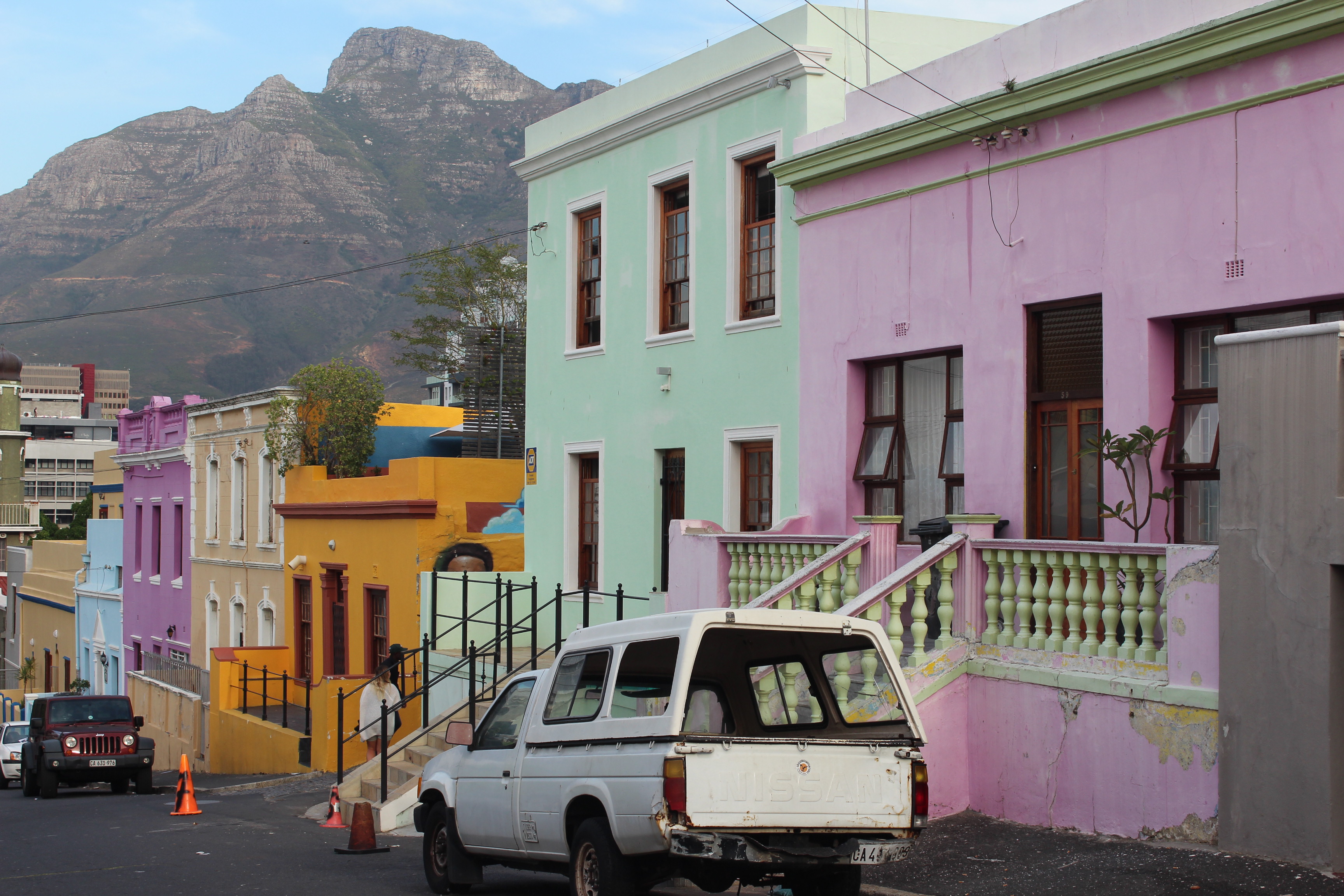
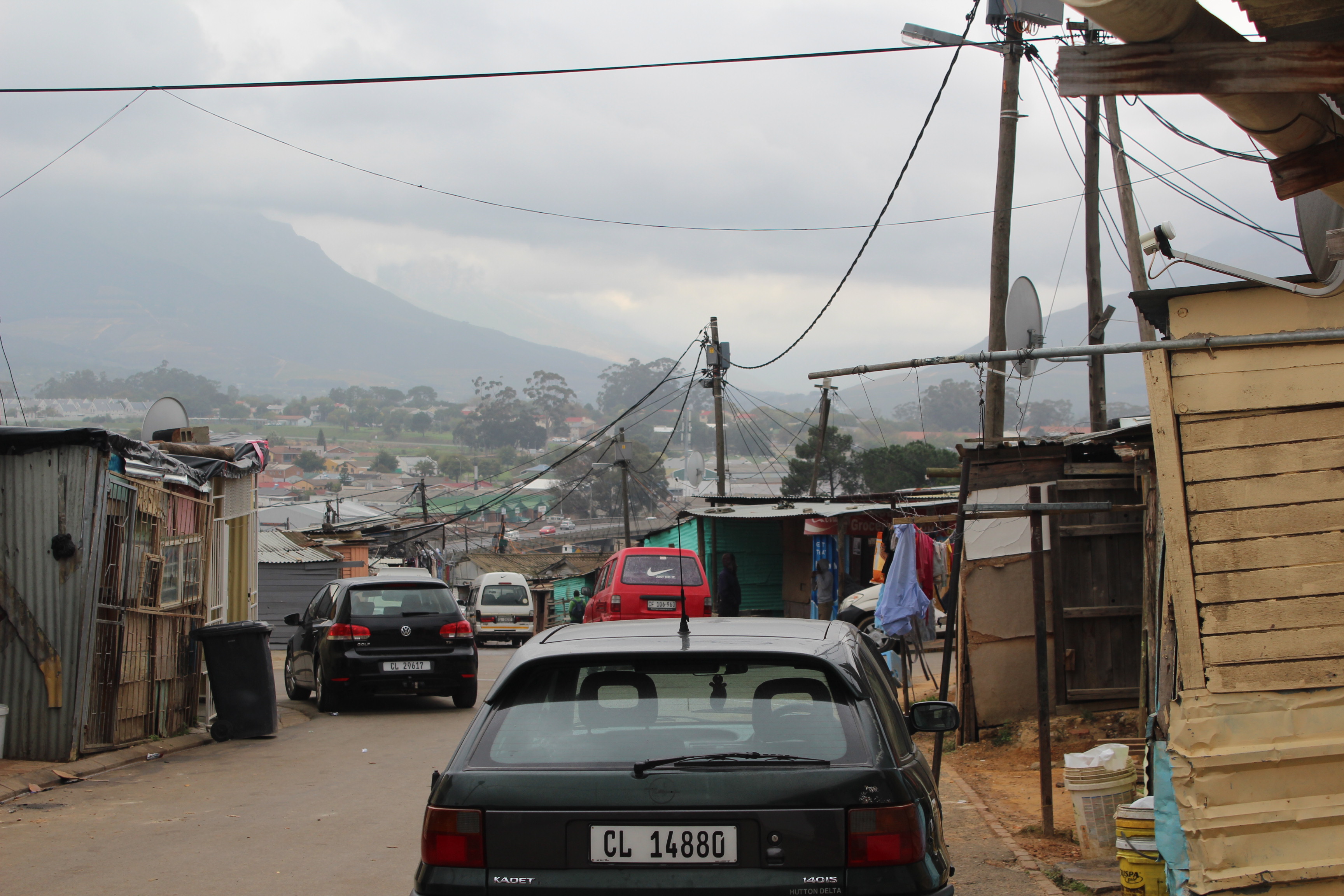
My time in the township of Kayamandi was spent with a class of third graders. With the help of other students studying with me, we put together activities that would allow the kids to practice their English skills while also exercising their creativity. The native language of most of the township kids is Xhosa and Zulu, and it was our job to help them practice language skills while also making a positive impact on the kids. The whole purpose of my program was to get a hands-on experience with how development should occur. By working with the kids in the township I was able to evaluate my own views on development. I learned that development is whenever the people you are trying to help are given the necessary tools to reach their full fruition. Oftentimes, the things we think people need are not things that will help them flourish; what works for some societies may not work for another society. This is something I tried to focus on while in Kayamandi.
I realized the kids did not need a new curriculum or our suggestions for how to function better as a school. The kids need a clean playground without glass all over the ground. They need sponsors to pay their tuition at a school that will help them further their education. They need toys and books that look like them, instead of having only blonde, Caucasian Barbie Dolls. These things that seem miniscule can make more of a difference than what is seen as development by “developed, Western societies.” Many of the kids I worked with had never even been outside of the township and their family has to share one toilet with 10 other families. Things like this are the result of policies enacted decades ago and showed me how kids growing up in townships are at a disadvantage when compared to students from affluent communities so special attention needs to be given to ways that can help them grow.
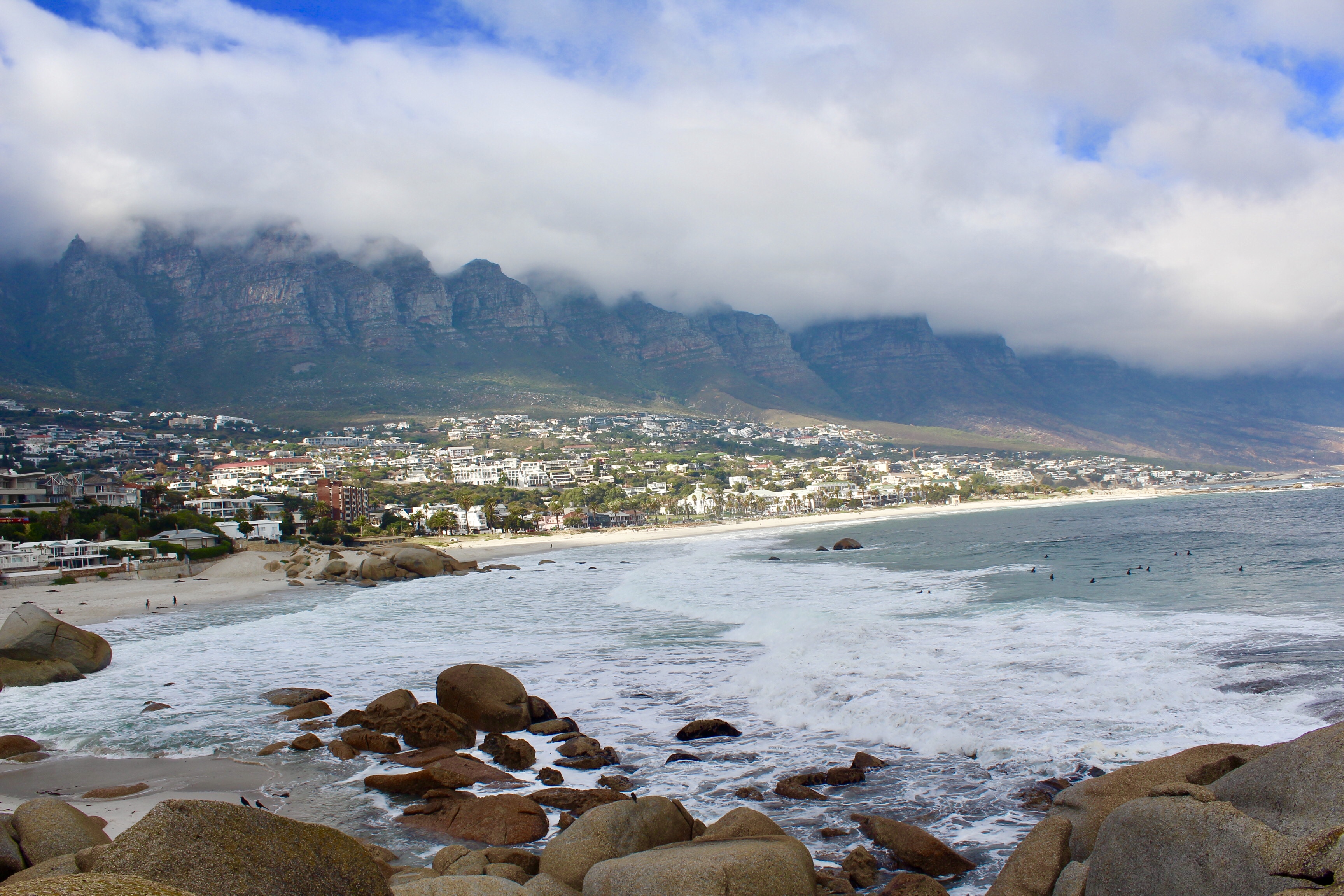

Another thing I learned from this experience is how apartheid, institutionalized racial segregation, came to be implemented in South Africa between 1948-1990 and how it stills affects a majority of citizens today. In my Politics of Development class, we tracked the history of South Africa, its colonization, and how apartheid went from being informally to formally enforced. It was interesting, yet heartbreaking, to see how something implemented 70 years ago continues to disadvantage specific populations and keep them from advancing socio-economically or academically. Townships were originally developed as areas for non-whites by apartheid legislation so working in one allowed me to gain an understanding of how policies can have a lasting impact on communities, even when they aren’t being formally implemented anymore. Oftentimes its structural division and power that keeps certain communities perpetually disadvantaged.
One of the highlights from my trip was having the chance to meet Wilhelm Verwoerd and Willie Esterhuyse. Verwoerd is the grandson of the architect of apartheid and has been disowned by his family for speaking out about the negative legacy of apartheid. Esterhuyse participated in the secret negotiations among the National Party and African National Congress, Nelson Madela’s party, that led to the end of apartheid. It was humbling to meet these two individuals and to hear how their perspective has changed over the years. Conversing with people that were such monumental figures in the downfall of apartheid was a once in a lifetime opportunity, and they both offered words of wisdom to live by like creating trust between enemies in order to facilitate negotiations.
Traveling and immersing yourself in other cultures is one of the best things you can do throughout your lifetime. It is a transforming experience and helps you to see the world from a different lense. You better understand why the world works the way it does, and you can evaluate proper ways to implement progressive change. I hope to take what I learned from this study abroad experience and continue to engage with populations that may not have the resources to have the voice they deserve. When traveling it’s fun to do all of the touristy things like going on safaris, dining at fancy restaurants, and petting elephants, but the most rewarding part is learning about other people and hearing their stories.
By Taylor Ogden
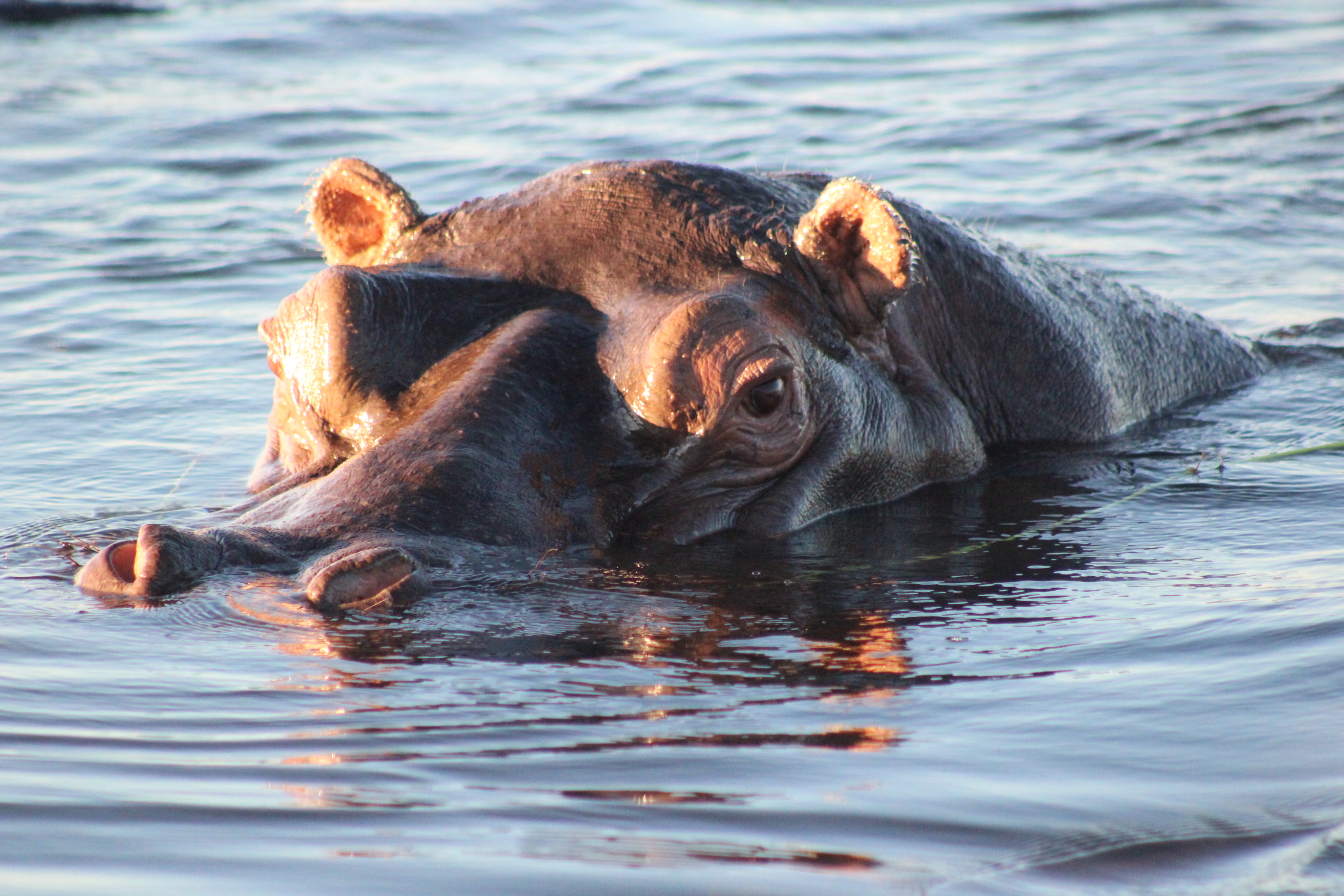
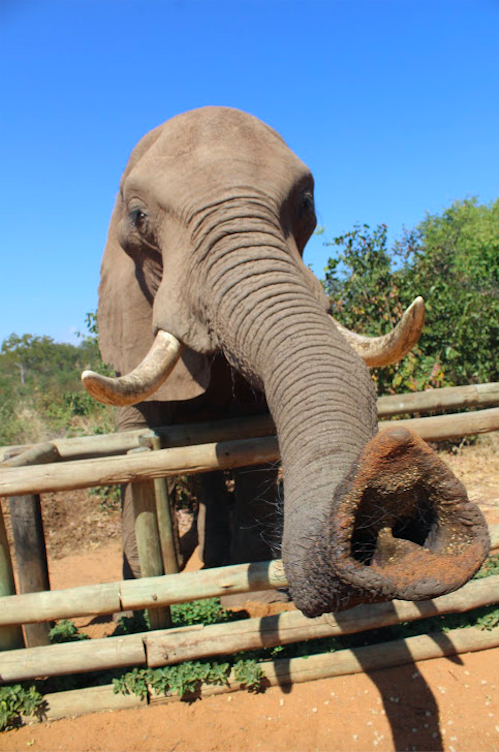
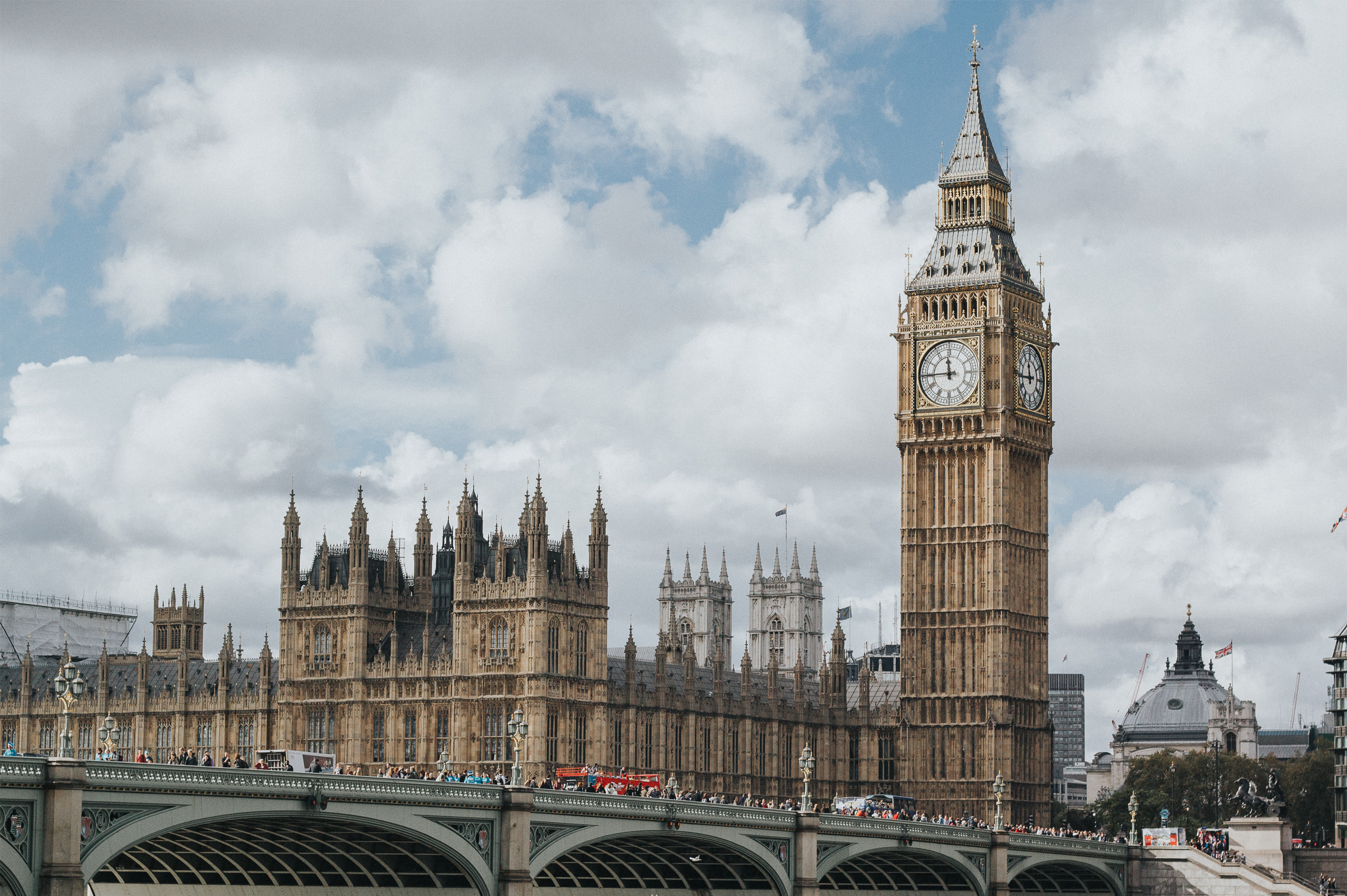
- Details
- Category: Blog Posts
As many of you know, last semester I studied abroad in London, England with CIS Abroad and it was the best semester of my life. Now that I'm back and connecting with friends new and old, I can't help talking about how much I loved London and why it's such a great place to live. In this post I'm going to talk a little about why I loved it so much and why YOU should study abroad in London!
1. The food
I wanted to start off with this one because British food gets such a bad rap. I've heard people say that it's bland, tasteless, and strange- and don't get me wrong, beans on toast is something I'll never eat in a million years- but saying all food in the UK is bad is fake news. London in particular is such an international city, with people from all over the world- and this translates to restaurants from every nationality and palate. You can find whatever you're craving in London; and it'll be delicious. One of my favorites was Dishoom, a Persian/Indian chain with several locations across zone 1. They have an incredibly diverse menu and everything on it is sooooo goooooood. I recommend ordering lots of plates to share with the table, so you can get the authentic Indian experience! Another place I loved was On The Bab, a Korean street food chain. There was one right near my flat in Shoreditch and every night it had a line out the door and down the street of people waiting to eat! Try the bibimbap with kimchi- it's a traditional classic.
2. The nightlife
London has all the allure of a big city- and that includes the nightlife! It's not just limited to pubs though, there are a million things to do! One of my favorite evening activities was going to see a West End show (Book of Mormon and Wicked are great) and then walking to Piccadilly Circus to grab gelato from Gelupo, which in my opinion is the best gelato outside of Italy. They have tons of options- from traditional chocolate and vanilla to honeycomb and toasted rice (my fav) flavors! Their menu also changes every day so you're always in for a sweet surprise when you walk in. However, if you enjoy a night out at a club, London has those in abundance! Piccadilly Circus is a fun area to go out in, but Shoreditch is an up-and-coming trendy area with a lot of funky holes-in-the-wall. If you're in the area, check out Ballie Ballerson- it has multiple ball pits and amazing drinks for an experience unlike any other!
3. The culture
If you're like me (read: a culture nerd) then you'll have no shortage of things to do in London. From museums, to music, to sports, to afternoon tea, there's something for everyone there. If you're ever looking for something fun to do on a rainy day (of which there are many), head over to South Kensington to the Victoria and Albert (V&A) museum. I don't know if it's the biggest in London, but it sure feels like it. It's too easy to spend hours on hours wandering through the many exhibits- they have art from cultures all around the world interspersed with temporary displays like a history of Winnie the Pooh or a collection of Balenciaga fashion. After you're done there (if it's still light outside), stop by Muriel's Kitchen by the tube station for the cutest afternoon tea with a great view of the area. If you're not the museum type, there's also tons of shopping nearby as well!
4. The travel
One of my favorite things about Europe and something I always mention to people is how easy it is to get from place to place over there. London itself has about 6 airports and countless train and bus stations from which you can get just about anywhere you want. And it's cheap too; planning an affordable weekend to Paris or Edinburgh will never be easier than it is when you're in London. Aside from international travel, London's public transport is absolutely fantastic. I could go on forever about how much I love the tube but I'll spare y'all and just say that I hope and pray that one day America will figure out how to have a system that efficient. In the city, you're never more than a 10 minute walk from a bus or train and you'll get to where you're going with such ease that your daily commute will become something to look forward to.*
*this section sponsored by Transport for London (kidding)
5. The city
6 months in London was more than enough to convince me that it's the perfect place. It's a true melting pot of people, cultures, and activities that has a life and spirit all its own. Yes, it is a big city and there are times when it certainly feels that way. But the thing I loved the most about it was how easily it allows you to make it your own- no one experiences it quite the same way and that's beautiful. If you let it, it will worm its way into your heart and become your home- even with the weather (which like the food gets too harshly criticized). As Samuel Johnson said, "When a man is tired of London he is tired of life." That certainly rings true for me, and I hope someday all of you get to experience this wonderful city for yourself!
(p.s. I literally always love talking about my time there so please ask me about it any time)
EAA Ambassador Amy Allen
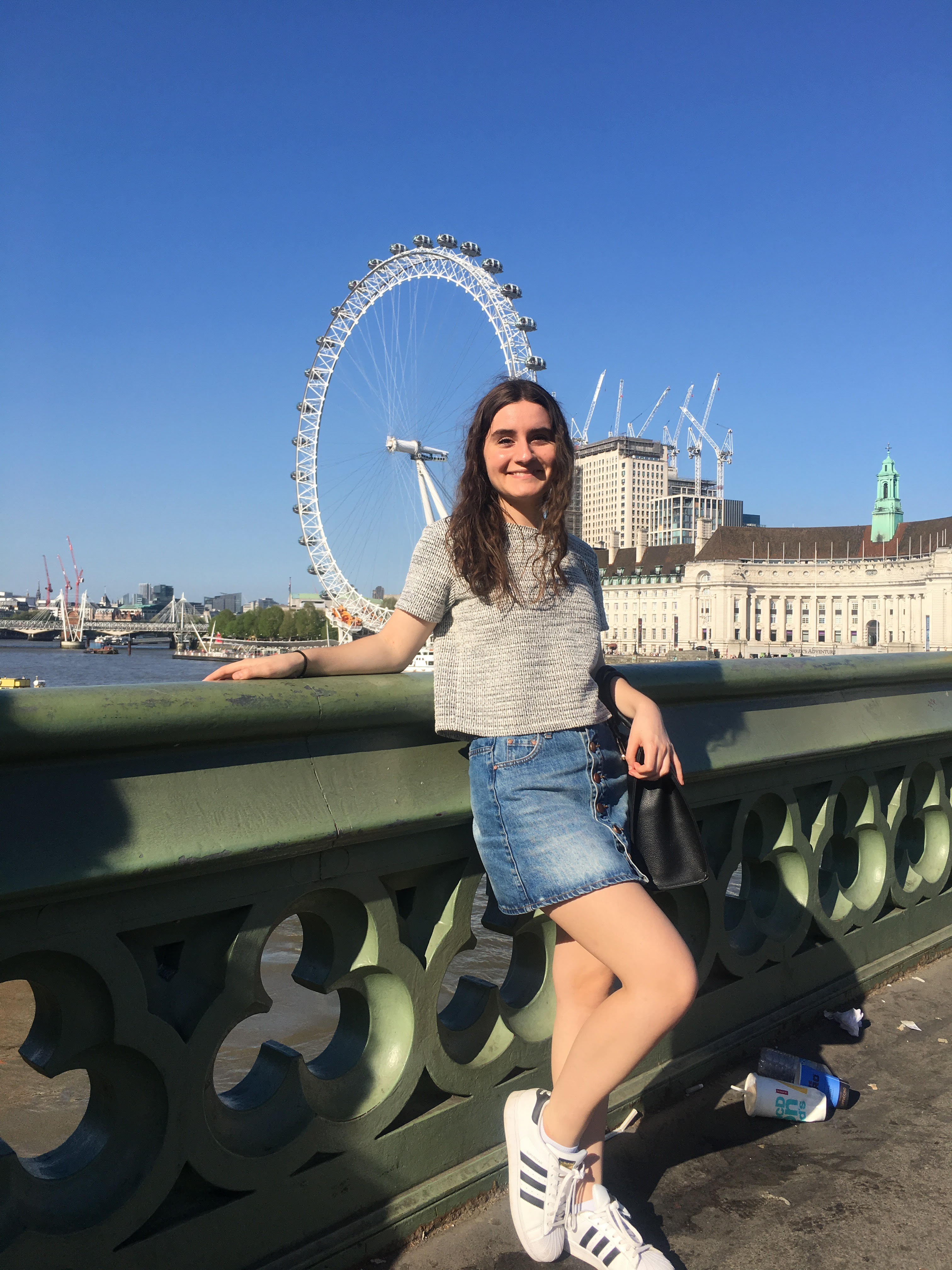

- Details
- Category: Blog Posts
Souvenirs are not why one should travel. Rather, the experience and what one learns is what should be valued. I have gained intangible experiences throughout my stay in UGA Costa Rica.
My perspective on academics has changed. I value the education I have received and will receive in the future, because many individuals have not had the opportunity to finish high school, middle school, or even, like my farm manager, barely finish elementary school. If you have the ability to go to college here, you are extremely privileged, and that is your ticket to success. However, for my own studies, I am excited to get back to school to learn. But at the same time, I am ready to not have the structure of school and rather, start getting out in the community and making an impact. I am ready for more experiences and education that school can no longer give me.
This point is followed by my personal goals. I am ready to begin my journey on achieving goals outside of the classroom. I want to continue to travel, learn, and be aid wherever it may seem fit. My goal is to work in communities to create a greater access to nutritious food. By being in San Luis, Costa Rica, I have seen families with very little in eyes of the United States’ standards. Families living on $500 a month and trying to make decisions between good foods to eat or sending their children to school. This is a decision that I hope one day will not have to be contemplated.
There have been many highlights on my trip. The first was making friends with one of the interns named Michaela. When she told me I was her friend, I finally felt accepted here. There was a sense of relief to know I had a real friend. Another highlight was when I returned from a beach trip with a friend and we saw our mountain from a distance, I had a feeling that I was returning home. This was a pivotal moment when I realized that San Luis was my home and how much I loved all the people there. Other times were on the farm when Marlon, the farm manager, taught me that mistakes were okay to make and that all will be okay. Then, there are always the beloved soccer games with the maintenance crew which is always a highlight because they are so much fun. Another highlight was when the interns and I had the opportunity to climb a tree and sit 60 feet above the world and look over the other trees to the ocean. It was an amazing experience, and it was a time I conquered my fear of heights. And lastly, when we went on an employee beach trip, this was a highlight because it was a great bonding experience with everyone. There are far too many highlights to discuss all of them. Each day there is something new that happened or something new to learn.
My worldview has changed. I appreciate the luxuries I have in the United States like paved roads, a diversity in food options, easy access to transportation, even the diversity in people and backgrounds. But also, I value much that is here like the appreciation for the environment, the close-knit community, the generosity, the patience, and the attitude to enjoy the moments rather than always be on the go. I know this is a comparison of only two very distinct places that I have lived, UGA Costa Rica and Atlanta, Georgia. But to experiences such drastic and such small differences between only two places has given me the perspective that the world is much larger than I expected. There are values, perspectives, and traditions that vary throughout; but nonetheless, there is much to value in each. The diversity is why the world is fascinating that offers much to see, experience, and learn.
-Alaina Buschman

- Details
- Category: Blog Posts
What are we but a mixture...
“Education is what remains after one has forgotten what one has learned in school.”
-Albert Einstein
You’ve probably heard someone complain about classes they’ve had to take or material they were required to learn in school that they deem completely irrelevant in comparison to things you suspect you need to know in everyday life. Some of my favorites include some variation of the following: “I’ve been out of school for X number of years now and have still yet to need/use the Pythagorean Theorem” or “I don’t know how to apply for a loan, can’t balance a checkbook, or know how to buy insurance, but I know about the powerhouse of a cell.” We often learn about things that, after a little while, become irrelevant and fade from our memory. However, after today, this quote speaks volumes to me as I reflect on the invaluable knowledge I acquired from a Costa Rican man that moving forward and after I depart from this country, I know I will carry with me always.
Today was our first full day in San José, Costa Rica, and while it is quite a change from the quiet, secluded campus of UGA in San Luis, it provides us with ample opportunity for exploration, growth, and learning.
Instead of bungalow A1, A2, B2, B3, or B4, we all woke up in Hotel Ave de Paraiso. Paraiso is a quaint and gorgeous family-owned hotel nestled far enough behind building-lined streets to be invisible from the average passerby. Blue and terracotta colored tiles create stunning mosaic artwork that lines the floors, walls, and steps of this hidden gem, each building featuring unique patterns and pictures all its own as you walk to the comedor to enjoy breakfast.
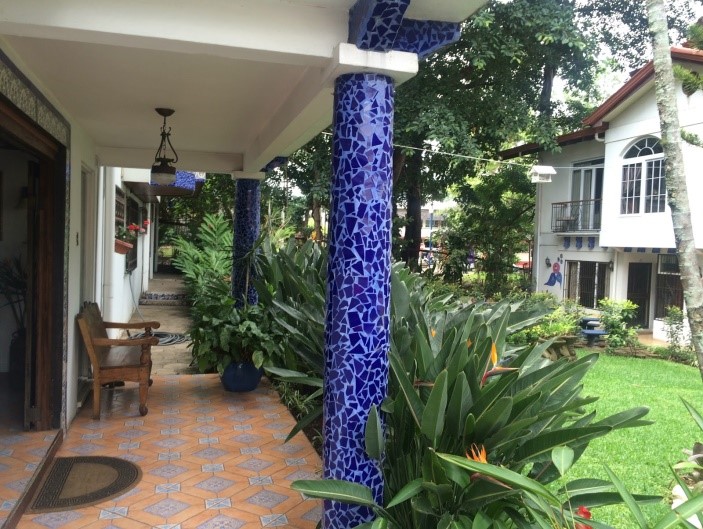
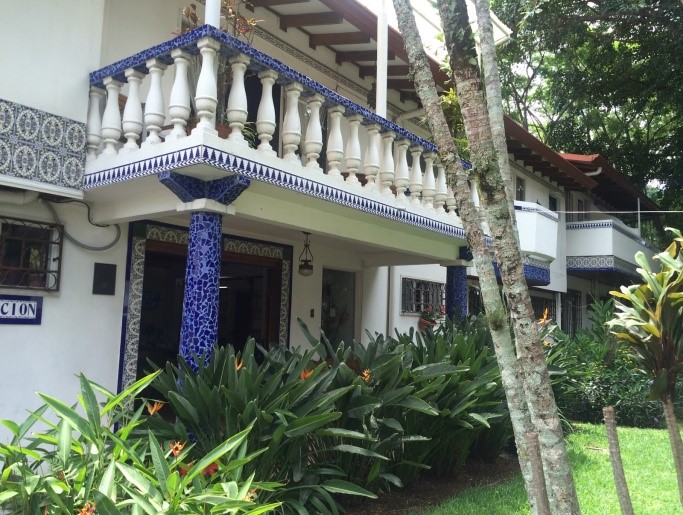
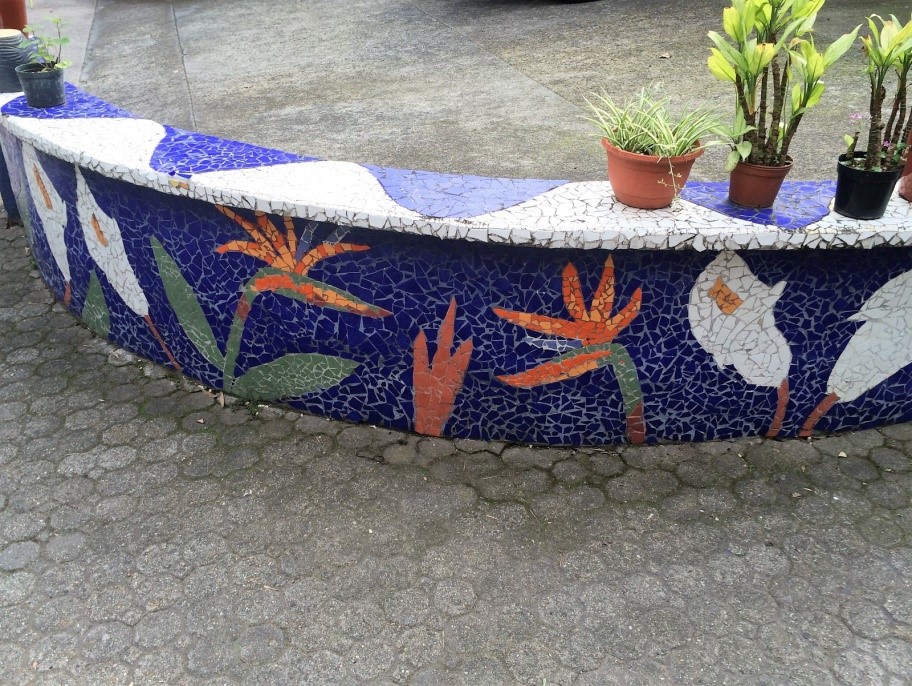
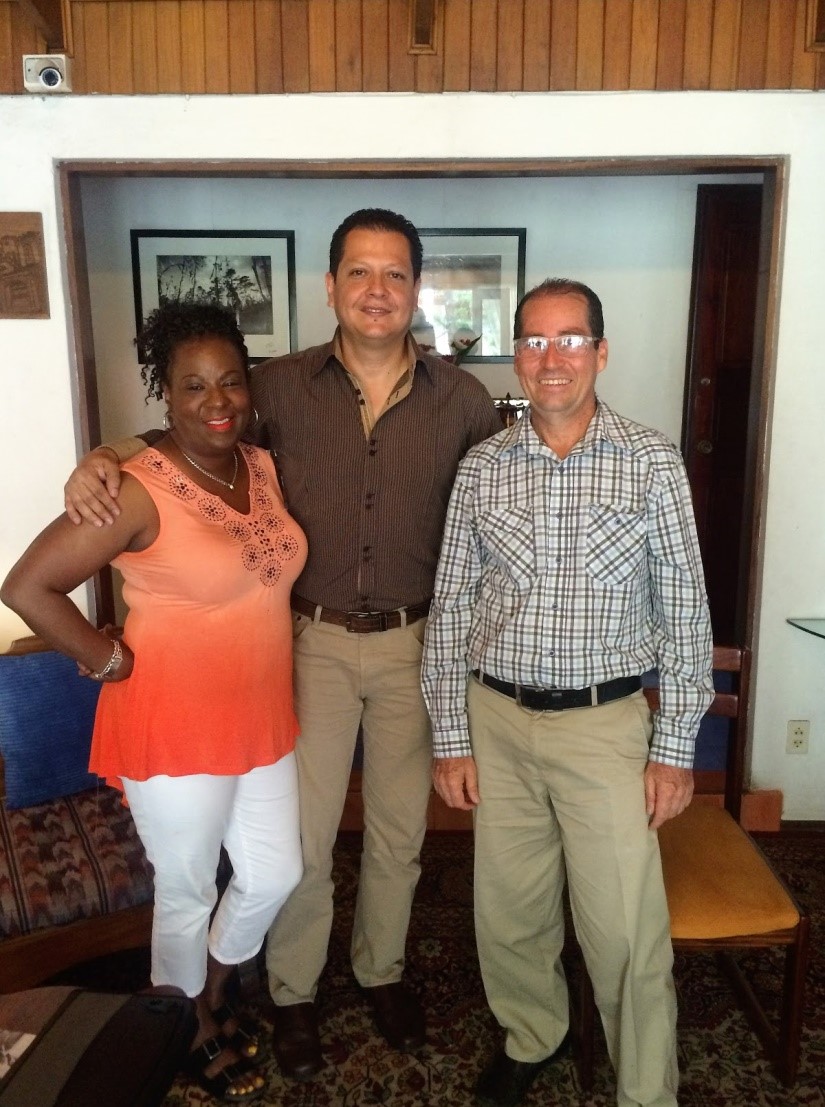
After our group ate breakfast, our main agenda item for the day included a presentation and talk by Mauricio Melendez, a genealogist, who was born and raised in Costa Rica. Mauricio was joined by a translator, José, who was also born and raised in Costa Rica and had joined the Peace Corps to educate others on how to teach English and classroom etiquette. Once we began, Mauricio educated us on the history of different racial, ethnic, and cultural groups in Costa Rica and how they have changed over time. He also discussed with us the historical framework for each group, and the social implications for different labels and verbal codes used here in Costa Rica. This allowed us to ask questions and compare and contrast the information we were receiving from Mauricio with what we know about racial history and issues in the U.S. While we know that racism is alive in the U.S., it was a completely different experience to learn about the ways in which racism came to exist in Central America and Costa Rica, and it’s continued impact on the country of Costa Rica today. After discussing the history and mixing of cultural groups, Mauricio said something that was translated so beautifully by José that I had to make sure I added it to my notes: “What are we but a mixture? We are all a mixture, all humans are.” (Mauricio Melendez)
After meeting and talking with Mauricio I was curious to know what my fellow classmates thought of his presentation. Some of my classmates thoughts are as follows:
“Our conversation with Mauricio was genuinely one of the most interesting conversations i've ever had because of the multifaceted nature of race. It was very interesting to learn about the long history of racism in Costa Rica and Latin America in general, the prejudices held between specific groups, and the implications the stereotypes have on race relations today.”
-Bobby French
“He was very passionate about his study and helped me see the history behind the culture of Costa Rica that I am being exposed to during this trip.”
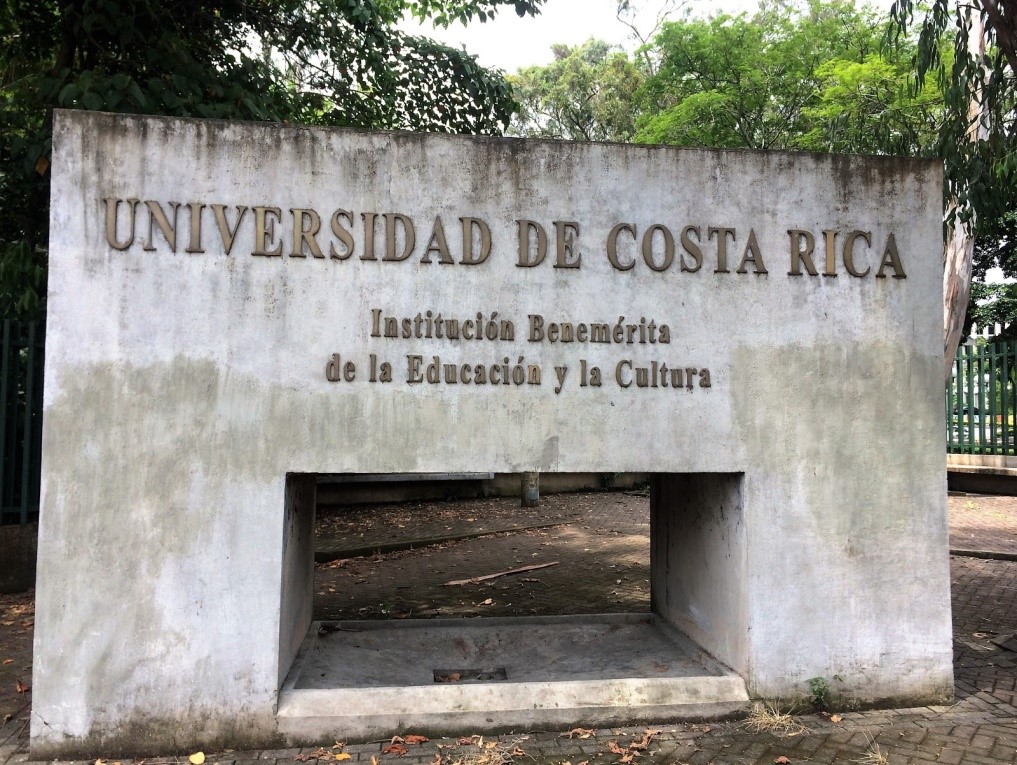
-Mitchell Doty
While our talk with Mauricio was complex and full of content, we all needed lunch to recharge for our day. We walked about ten minutes down the road passing by the University of Costa Rica to the mall and decided to try our hand at navigating the food court. There were a ton of options ranging from local, Costa Rican fare, to American chains like Pizza Hut, Popeyes, and Taco Bell. After lunch we had some free time to browse the mall and shop. Walking around the mall was a new experience for most of us, as we all received stares and acknowledgement that we clearly were from The States.
As a group, we share every meal together. This time together allows us to relax, enjoy excellent food, and get to know each other on a more personal level outside of classroom discussion. This time allows us to forge strong bonds and relationships and experience an aspect of Costa Rican culture simultaneously. Tonight we ate at a Peruvian restaurant called Machu Picchu that served authentic Peruvian cuisine. Everyone enjoyed their food, and Ashley ordered a Peruvian ice cream dessert that was similar to the taste of butterscotch.
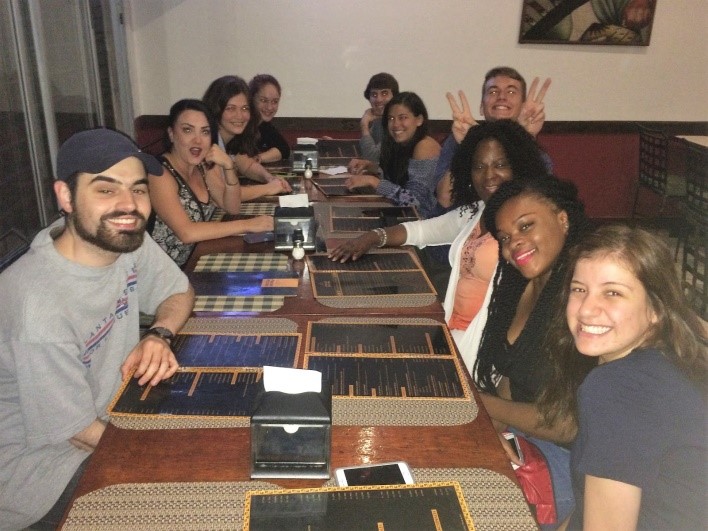
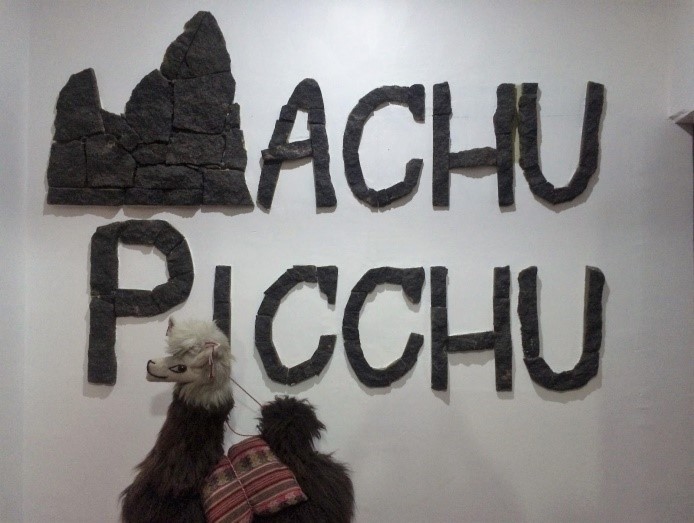
To round out the night, we stopped by a local grocery store to grab a few quick items that each of us needed. Unlike in The United States, the entire front of the store was open to the outside environment, allowing for ease of access for both entering and exiting.
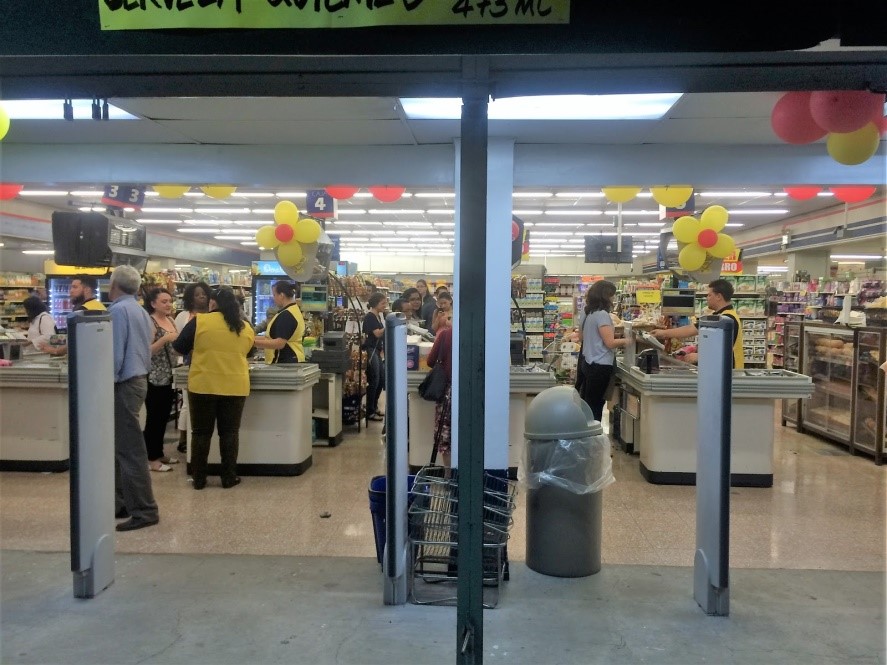
There is so much culture here in Costa Rica to be experienced that can serve as a teaching tool in many areas of life. As people, we have the ability to make significant impacts and lasting impressions on those we come into contact with. Although I probably will never meet Mauricio again, I will not only remember his expansive knowledge on race relations and communications in Costa Rica, but I will also remember how important it is to never forget that we are all in this together--we all share this life. I was truly educated by Mauricio.

- Details
- Category: Blog Posts
I spent the days and weeks before I left for Italy scouring countless blogs, Pinterest posts, and websites for any advice I could find about what to pack. Not only would I be in Italy for 3 months, but Italian weather from January to April ranges from arctic cold wind to sweltering heat. On top of that, I knew that if I forgot something that couldn’t be easily replaced in Italy, I’d have to survive without it for a quarter of the year.
Many websites listed things that nobody would even hesitate to bring to a foreign country—obvious things like adapters, converters, and even passports. Some listed such small and insignificant things that quite literally nobody needs to worry about while traveling, or items so large and cumbersome that they wouldn’t fit in any normal person’s suitcase.
To make the terrifyingly-exciting process of preparing for a study abroad slightly less terrifying and much more exciting, here are my top 6 things to pack!
1. Luggage Locks
Hostels are a fun way to live in a city while exploring the world. Staying in a hostel is an easy way to meet people from all over the world, and some hostels even have sponsored tours or dinners. It is also a good way to have stuff stolen, though, and there are plenty of horror stories of people meeting friendly travelers in a hostel room only to wake up and find all of their belongings stolen. Many hostels have lockers to store your luggage in, but in many cases these lockers come without locks—forcing you to either barter with friends or rent locks from the hostel itself. Not only does bringing your own locks with you save you a few euros, it can spare you the heartbreak of having something stolen.
I brought 2 locks with me to Europe, and when I backpacked on the weekends I would keep them latched on each compartment of my backpack. Pick-pocketing is even more likely than being robbed at a hostel, and having the peace-of-mind that nobody could grab something out of my backpack while I was exploring was absolutely invaluable. If you’re wandering around Amsterdam, it’s nice to know that someone would literally have to break through a lock to get to your laptop—and it would be pretty hard for you not to notice someone forcibly trying to open your backpack.
2. Filtering Water Bottles
One of the things that irritated me the most while I was traveling was how much money a single water bottle cost. Whether it was buying a $3 Dasani at the airport before even getting on a plane, or spending 4 Euros for water at dinner (since Italian restaurants have an issue with tap water, despite the fact that it is completely healthy to drink throughout the country), staying hydrated was expensive. Bringing my own water bottle kept me hydrated during my 6 hour lay-over in Rome, and even helped me avoid getting sick from the water in Barcelona while my friends felt terrible for days after we left. I used a $12 Brita filtering bottle from Walmart so that if I lost it or had to leave it somewhere I wouldn’t be heartbroken, and it was one of the best $12 purchases I’ve ever made.
3. Tide Sink Packets
European washers and dryers aren’t very friendly on clothes. Many students on my trip ended up with rainbow colored whites, hole-y shirts, and sweaters that shrunk four sizes after 10 minutes in the dryer. By the last month of our program most of us were washing our clothes in the sink and hanging them to dry—not the best way to ensure clean clothes, but at least they didn’t get ruined. I went to the travel section in Bed, Bath, & Beyond before I left the states and loaded up on tide to-go packets, then used those to keep my clothes clean and functional all semester. They come in packs of three for about $1.29 and are small enough to fit anywhere in a checked bag. Just grab a handful before you leave, and your clothes will have a much better chance of making it back to the states!
4. Multivitamins
It doesn’t take a genius to know that Italians love their carbs. Some of my friends who had already traveled to Italy actually clued me in to another Italian food secret before I left: the Italian diet is not the most well-rounded in terms of iron and protein. I came prepared with multivitamins that specialized in these two important things, but many of my friends didn’t. After a few weeks of eating only pasta and pizza, many of them had varying levels of anemia that made them exhausted all the time. By the time we got to spring break and all travelled to Munich together with our program, we had to eat an enormous amount of meat in Germany to make up for the lack of meat we’d been getting in Italy. Multivitamins aren’t a requirement by any means, but they were an easy way for me to combat some of the symptoms my friends experienced and helped prevent me from getting sick every other week.
5. Bluetooth Speaker
This was one of my favorite things I brought to Italy with me. Wine nights were a common occurrence (we were in Italy, after all), and being able to listen to good-quality music while we were hanging out and drinking 3 Euro bottles of wine was amazing. On that note, throwing a small travel-sized wine opener and some ping-pong balls into your checked bag isn’t a bad idea for hang-out nights either!
6. Portable Charger
You absolutely cannot travel without a portable charger. With all of the pictures you’ll take, and all of the times you’ll have to resort to using google maps to get around a city, phone batteries drain very quickly. Granted, I always downloaded the city map on Google Maps of wherever I was traveling to before I left (and if you don’t know how to download google maps to use without data or wifi, research that before you leave because it is an absolute life-saver), but even using the location ability on my phone would kill my battery in a few minutes flat. I had a cheap $5 charger that I’d passively grabbed at a checkout line in Target before I left for Italy, and it worked pretty well to combat all of the battery I used on a daily basis while traveling. In retrospect I would definitely have invested in a better quality portable charger (and plan to for my future travels), but even the cheap one I bought saved me and my friends in many instances. It’s an easy purchase that could keep you from getting lost on the way back to your hostel at 2am in a city where you don’t speak the language or know a single person besides your friends that are as confused and clueless as you—and trust me, that’s not nearly as fun as it sounds.

